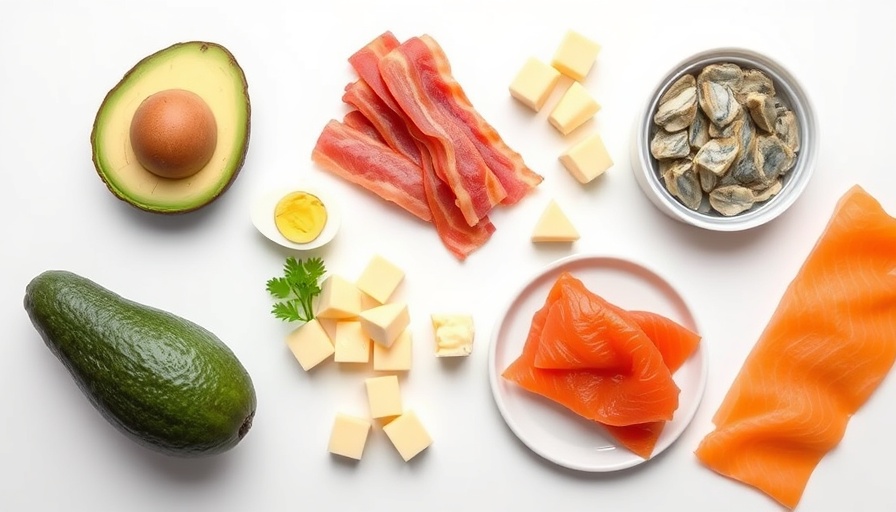
The Quest for Protein-Dense, Lower Fat Foods
In a world increasingly driven by health consciousness and the quest for longevity, understanding the significance of protein intake cannot be overstated. But not all proteins are created equal, especially when it comes to fat content. This exploration will illuminate the most protein-dense, lower-fat foods that can effortlessly fit into your daily diet. As our bodies age, we need to optimize our nutritional strategy to ensure we're fueling our cells with quality nourishment that supports not just longevity but also overall health.
In 3 Most Protein Dense Lower Fat Foods, the discussion dives into essential nutritional choices, exploring key insights that sparked deeper analysis on our end.
Current Trends in Protein Consumption
The latest trends in nutrition emphasize a shift from high-carb diets to those rich in protein, which tie into myriad health benefits such as muscle maintenance, weight management, and cellular health. Scientific studies suggest that protein consumption can play a vital role in healthspan optimization. For those health-conscious individuals, monitoring the protein quality and fat content is vital, particularly for preventing age-related muscle loss. Higher protein intake supports telomere length, which is directly correlated to aging research and cellular health.
Spotlight on the Most Protein-Dense Foods
Let’s delve into the top contenders for protein-dense, lower fat foods that can supercharge your nutrition:
- Chicken Breast: A classic favorite, this lean source of protein delivers about 26 grams of protein per 3-ounce serving with minimal fat. It’s versatile, allowing for a range of culinary experiments from grilling to stir-frying, perfect for those aiming for muscle growth or maintenance.
- Egg Whites: The whites pack a whopping 3.6 grams of protein in just one egg, with virtually no fat or cholesterol. They are a fantastic addition to smoothies or omelets, keeping your meals light and protein-rich without the calorie count climbing dangerously high.
- Greek Yogurt: Not just a trendy snack, Greek yogurt contains between 10-20 grams of protein per serving, depending on the brand and flavors. Opt for low-fat versions, add some berries, and you have yourself a delightful dessert that boosts gut health while packing in the protein.
Why Protein Matters for Longevity
Protein plays a multifaceted role in our body, from supporting the immune system to facilitating recovery from workouts. But perhaps the most crucial aspect, especially as we age, is its effect on cellular health. With comprehensive studies highlighting the link between adequate protein intake and telomere maintenance, it’s evident that keeping those cellular clock hands ticking can lead to a more extended healthspan and improved quality of life.
Diverse Perspectives: Calculating Your Protein Needs
There’s no one-size-fits-all answer when it comes to determining your protein requirements. Factors such as age, activity level, and specific health goals play significant roles. Consulting with a nutrition expert to personalize your dietary strategies can be pivotal. Some might benefit from a higher protein intake for muscle gains, while others focused on longevity might look at balanced nutrition that reduces unhealthy fat intake.
Actionable Biohacking Techniques to Boost Protein Intake
For those keen on integrating these protein-dense foods into their lifestyle, consider these biohacking tips:
- Meal Prepping: Preparing meals in advance ensures you have healthy, protein-rich options ready for busy days. Cook your chicken or prepare yogurt smoothies to simplify your dietary choices.
- Smart Snacking: Keep boiled eggs or protein bars handy for a nutritious snack that effortlessly adds to your daily protein tally.
- Conscious Swapping: Integrate lower fat proteins into your existing recipes. Swap out sour cream for Greek yogurt in your favorite dishes.
Looking Ahead: Future Predictions and Trends in Nutrition
As ongoing research reveals more about the connections between diet and longevity, we can anticipate exciting trends. Polled data suggests a growing preference for high-protein, low-fat eating models, and innovations like protein-enriched foods may soon flood the market. Technology-driven nutrition solutions, like personalized health strategies, are poised to become more mainstream as we continue to uncover the science of aging and wellness.
Incorporating protein-dense, lower-fat foods into your diet isn’t just about eating nutritiously—it’s about launching a proactive approach to your health. With evidence continuing to mount supporting the benefits of high-quality protein sources, understanding how to leverage these benefits for disease prevention and wellness optimization is paramount.
In this ever-evolving field of nutritional research, keeping knowledge up-to-date is crucial. It’s time to embrace these findings enthusiastically and take actionable steps towards a healthier life!
 Add Row
Add Row  Add
Add 




Write A Comment